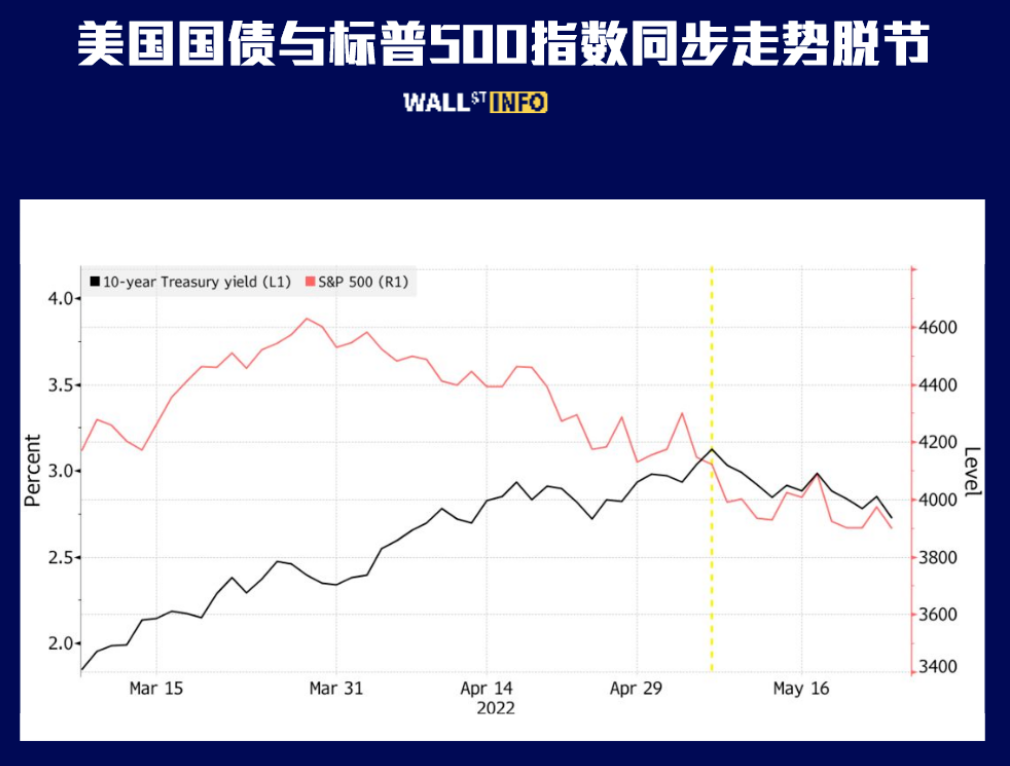Only when the Fed starts to panic will the market stop panicking. Only when the market collapses will the Fed surrender
After last night, the new main line of trading in the market began to become clearer-cutting the bet on raising interest rates (reassessing the Fed's path of raising interest rates).
-At present, the market expects the end rate of the Fed's current interest rate hike cycle to be 2.95% (which is expected to be further reduced), which is lower than the 3.1% expected on Monday and lower than the 3.5% at the beginning of the month.
-The next two meetings are still expected to raise interest rates by 50 basis points, but the probability has dropped from 82% on Monday to 68%.
-It is expected that the rate increase in the next three meetings will be 134 basis points, which is lower than the previous 141 basis points (that is, the expectation of raising interest rates by 50 basis points in September has basically subsided).
There are two major factors behind such a major change:
First, the poor performance of economic data and the intensification of recession fears
Both data released last night shocked the market.
-Sales of new homes in the United States fell to the lowest level since the beginning of the epidemic (less than all economists expected), the biggest decline in recent nine years.
-The confidence index of American residential builders has fallen for five consecutive months, and it has hit the biggest decline since the epidemic.
For many Americans, home ownership is becoming increasingly out of reach, as rapid increases in mortgage rates reduce home inventories and send prices soaring.
Before Tuesday, all three indexes fell sharply as gloomy reports on home sales and the outlook for businesses deepened investor pessimism. Stocks rallied later, but finding a reason to enter the market remains an uphill battle amid mounting negative signs about the health of the economy.
Second, the doves of the Federal Reserve began to act
After throwing out the idea of "suspending interest rate hikes in September" yesterday, Atlanta Fed Chairman Bostic published an article "Monetary Policy in Dynamic Changes of Labor Market", urging the Fed to be cautious when tightening policy.
Key points of the article:
As we quickly return monetary policy to a more neutral stance to bring inflation closer to our 2 percent target, I plan to keep an eye out for the advance and avoid recklessness. We saw during the epidemic that events and market changes may happen soon.
Uncertainty hangs over almost every aspect of the economic outlook, from the pandemic to the war in Ukraine to tight supplies. Policymakers must pay attention to these uncertainties and act cautiously in tightening policies.
We must all be prepared for unexpected events, assess how risks change, and keep an eye on the strength of the economy. Even fire engines that sound sirens will slow down at intersections to avoid more preventable troubles.
The hawkish expectations of the Federal Reserve are at their peak, and we may see more dove officials come forward and make similar speeches in the future, which will become a trend. The prospect of the Fed raising interest rates is basically digested by the market (the US dollar usually falls after the market reflects the Fed's expectation of raising interest rates).
Although the worst is over, the good news has not yet arrived. Because what we are seeing at present is only the "hawkish stop" of the Federal Reserve, the current stock market trend has not yet reached the level of the Fed's intervention (the stock market will bottom out when the Fed's monetary policy turns loose). Only when the Fed starts to panic will the market stop panicking.
Vickie Chang, a strategist at Goldman Sachs, said that once the Fed sends a signal to end tightening, the stock market will bottom out; The Fed may not send this signal until the recession is obvious. Monetary policy has historically stopped tightening about three months before the stock market bottomed, and then shifted to loosening about two months later.
Next, we will return our attention to the US Treasury bond market, which sends many signals:
1. The bond market and the stock market began to stop fluctuating in the same direction, and the stock market fell while the bond market rose, indicating that the smartest traders no longer regard inflation as the biggest threat, and they are more worried about economic recession in the short term;
After the 10-year US bond yield reached a peak of 3.1%, the synchronous relationship between the stock market and the bond market reversed
2. There are signs of re-buying in the bond market. When the bond market panicked, Wall Street investment veterans had already bet on the other side. The trend of two-year US bond yield synchronized with interest rate expectation and 10-year US bond yield synchronized with inflation expectation will be the focus of our attention.
The next major risk event is at 02:00 tomorrow morning, when the Federal Reserve announces the minutes of the May monetary policy meeting, which can give a deeper understanding of the Fed's tightening path.
Waiting for Powell to surrender.
$NQmain(NQmain)$ $S&P 500(.SPX)$ $ESmain(ESmain)$ $YMmain(YMmain)$ $MYMmain(MYMmain)$ $CNmain(CNmain)$





Comments